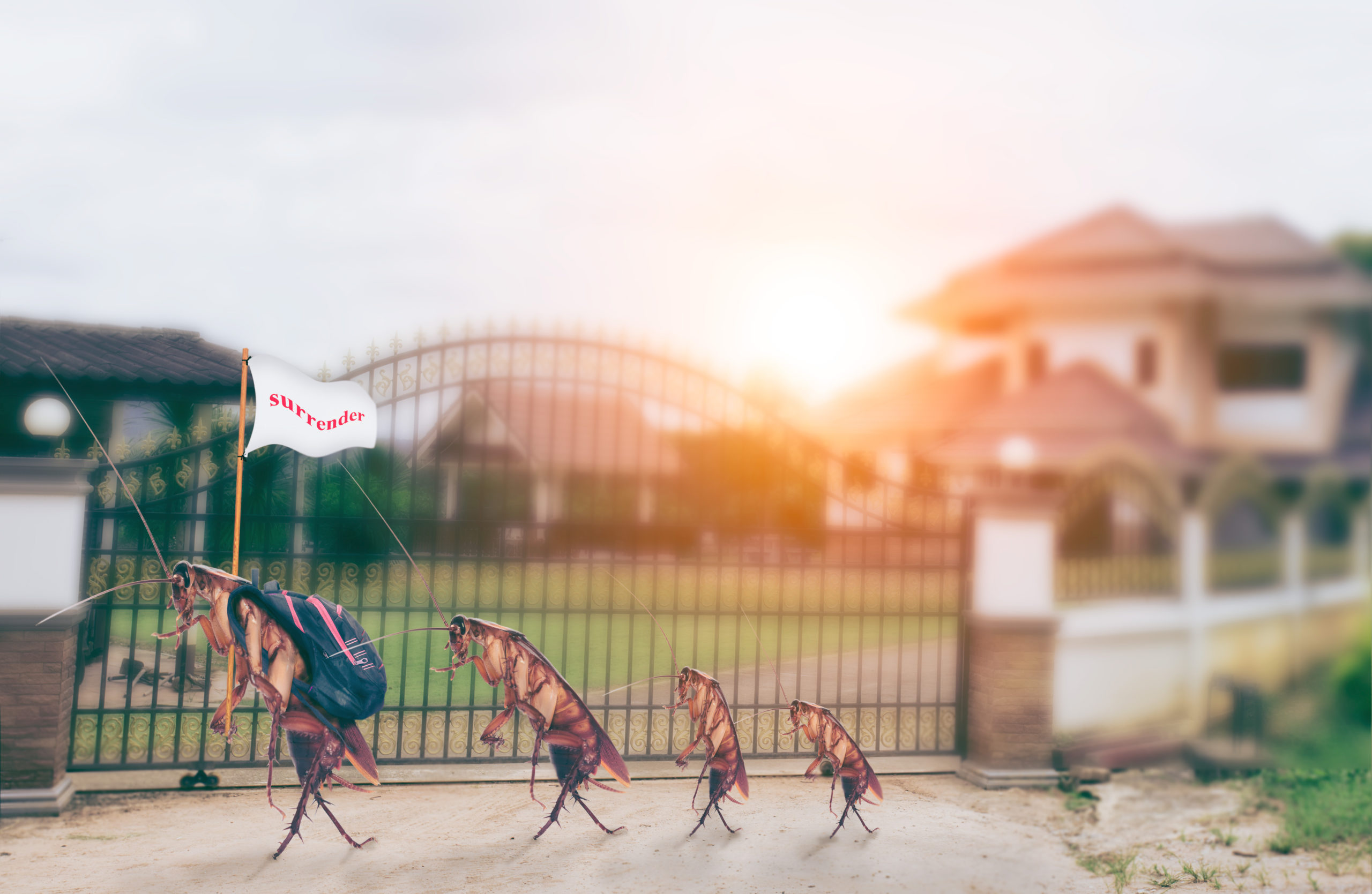Is Pest Control a Good Investment?
Is Pest Control a Good Investment?
Short answer… yes! But we won’t just leave it at that. Here we delve into all the ins and outs of professional pest control and why it truly is a positive investment for your family and your home.
Dangers and Costs of Infestations
Pests are more than just annoying, they can potentially be very dangerous. A lot of common pests pose various risks to your health and safety, this includes:
- Stinging Pests – While there are a variety of sub-species of each of these kinds of stinging pests, they all have something in common: they can all sting and bite their victims’ multiples times. The dangers and effects of their venom can vary drastically from one species to the next, but their attacks typically happen as a swarm, increasing the health risks of such an encounter by their sheer numbers. Furthermore, for those who are allergic, a simple encounter can potentially be deadly.
- Rodents – Rats and mice are known for spreading over 35 different diseases worldwide including Hantavirus Pulmonary Syndrome, Lymphocytic Choriomeningitis, Rabies, Hemorrhagic Fever with Renal Syndrome, Lassa Fever, Black Plague, and more. As rats and mice scurry through homes, they defecate, urinate and leave behind salvia, contaminating everything they touch. Coming into contact with these rodent excrements, or even direct contact with the rodents themselves, can lead to contracting a rodent-borne disease.
- Spiders – There are a variety of species of spiders that are venomous and can harm you significantly. For example, brown recluse bites can cause skin necrosis (death of skin tissue) and the venom of black widows can cause extreme health complications and even death.
- Cockroaches – Roaches slink through homes leaving behind droppings, saliva, shed skin shells, severed body parts, and more, all of which can leave behind pathogens, or even become airborne debris. Once airborne, these allergens are known for causing severe breathing complications for people with asthma or other breathing difficulties.
- Ticks – Ticks are increasingly becoming a larger risk as a vector of disease. In addition to Lyme disease, these arachnids can also pass Rocky Mountain Fever, Heartland virus, Colorado tick fever, Bourbon virus, Powassan disease, Tularemia, Rickettsiosis, Ehrlichiosis, Babesiosis, Anaplasmosis, and more.
- Mosquitos – Named the “World’s Deadliest Animal” by the CDC, mosquitos are infamous for spreading a variety of detrimental and even fatal diseases. In fact, each year, mosquito-transmitted diseases account for several million deaths worldwide. Most infamously, mosquitos spread Malaria, West Nile Virus, Zika Virus, Chikungunya Virus, Dengue, and Yellow Fever.
In addition to all of the risks pests pose to your health, they can cause a drastic amount of damage to your home that can cause additional risks to the safety of your family. For example, wood boring pests like termites, carpenter ants, and carpenter bees can damage the stability of the wooden structures in and around your home, possibly even causing the structures to collapse. Rodents can also cause significant structural damage and can also chew through the electrical wiring of homes, putting you at risk of devastating electrical fires.
Medical bills can put immense financial strain on families and repairing structural damage (or even an entire home if it burns down in the unfortunate case of rodent-induced electrical fires) is nothing short of financially devastating, making infestations a potential money pit.

Risks of DIY Treatments
While some DIY techniques are effective, there are a fair amount that are ineffective and there is also the potential to run into a myriad of other problems, such as:
- Risk of Toxicity – a lot of store-bought pesticides are highly toxic and can be very detrimental to you or your family. As an example, if you are attempting to spray a wasp nest that is located up high, the spray has a tendency to drift down, showering you in a micro-mist of toxins that can get into your eyes, lungs, mouth, and cover your skin.
- Risk of the Environment – similarly, store-bought treatments also tend to be damaging to the environment and can end up killing local plants and wildlife as well as potentially contaminating nearby water sources
- Risks to Your Health and Safety – of course with the application of pesticides on your own, there’s always a risk associated with being exposed to toxic chemicals. But, in addition to this, you could be faced with increased danger to your health and safety the longer a pest problem permeates.

Benefits of Professional Pest Control
Professional pest control focus’ on continuously fine-tuning treatment methods and specializing services in order to always provide clients with the best service possible which includes:
- Minimal Use of Products but Maximum Effect – our tried-and-true methods, paired with our professional grade product and tools allow us to drastically reduce the number of spraying/applications around your home without sacrificing the highly measurable effects of our treatments.
- Eliminating Problems at their Source – years of experience, training, licensing, and perfecting techniques definitely count for something. This expertise allows exterminators to root out the source of pest problems, eliminating them for good, while some DIY sprays and techniques only “put a band-aid” on the problem.
- Safety/Protection – Depending on the type of pest you are dealing with, there can be dangers with trying to control them (ie. a large wasp nest). Hiring professional help keeps you and your family out of the line of fire, while our exterminators have the proper professional tools, gear, and experience to treat pest problems safely.
Furthermore, professional pest control services can actually save you money! Continue reading to find out how.

Average Costs of Pest Control Treatments
Pest control prices can vary drastically based on several different factors, the primary of which are the frequency of services and the type of services being provided due to the pest issue. Different frequencies of pest control typically fall under the following categories:
- One-Time Service – These treatments are only typically done for specific issues such as the removal of a wasp nest or bed bug extermination, which can be successfully completed with one service. The prices on these treatments can vary drastically (from $200-$4,000) depending on which pest is being dealt with, the severity of the infestation, and more.
- Monthly Services – While pest control companies rarely treat on a monthly basis, some do operate the billing schedule for Quarterly Treatments on a monthly schedule
- Quarterly Services – This is not only the most common but also the most effective pest control frequency plan. In a customer’s first year with such services, there are typically 5 services that take place, while all following years consist of 4 maintenance treatments a year with free follow-ups in between if needed.
- Seasonal Services – This primarily refers to mosquito treatments as these are typically only done during the summer months and early fall.
The national averages for quarterly and seasonal services are about $170 per visit, or within the range of $100 to $270 (this varies based on the severity of infestations, the products used, and the square footage of the area being treated). If charged monthly, this breaks down to about $60 per month. No matter which way the payment plan is arranged, the average national total for yearly services comes out to be about $740 per year, and at Green Pest Services it is often even less.

Cost and Risk Analysis
Infestations can be extremely devastating to your wallet due to the damage they cause in your home and to your health. So, while your yearly total for pest control may come out to be $600, a single trip to the ER from a pest related medical emergency can often match or even dwarf that cost. The same goes for intense structural damage to your home, electrical fires, or even mold and rot in your home due to pests such as rodents and roaches. Professional intervention can stop these problems before they get worse and even prevent problems from ever occurring in the first place. Ultimately, this can save you hundreds, thousands and even potentially hundreds of thousands of dollars in the long run.

Green Pest – A Great Investment
Preventative steps and some DIY methods can help reduce the numbers of pests, but if you want true elimination and protection, you need to take it to the next step with professional pest control services. At Green Pest Services, we provide solutions that are custom made for you, and with our local exterminators on your side, you won’t have to worry about pests and the potential physical and financial devastation they can wreak on your family anymore.
If you have any further questions regarding how professional intervention can help you and your family, contact us anytime. Our knowledgeable representatives are standing by to answer all your questions and help you find a solution that works for you.

Citations
Diseases Transmitted by Ticks – In the U.S. (2020) Centers for Disease Control and Prevention. The U.S. Department of Health and Human Services. The National Center for Emerging and Zoonotic Infectious Diseases – Division of Vector-Borne Diseases. Available at: https://www.cdc.gov/ticks/diseases/index.html (Accessed: September 2020).
Guide to Different Tick Species and the Diseases They Carry (2019) Mayo Clinic. Mayo Foundation for Medical Education and Research. Available at: https://www.mayoclinic.org/tick-species/sls-20127911 (Accessed: April 2020).
Health Hazards Posed by Rodents (2014) Pest World. National Pest Management Association. Available at: https://www.pestworld.org/news-hub/pest-health-hub/health-hazards-posed-by-rodents/ (Accessed: June 2020).
Mehta, F. (2018) What Happens After a Black Widow Spider Bite?Medical News Today. Medically Reviewed by G. Whitoworth. Available at: https://www.medicalnewstoday.com/articles/313647(Accessed: April 2020).
Mosquito Bites (2020) Mayo Clinic. Mayo Foundation for Medical Education and Research. Available at: https://www.mayoclinic.org/diseases-conditions/mosquito-bites/symptoms-causes/syc-20375310 (Accessed: January 19, 2021).
Mosquito-Borne Diseases (2016) Centers for Disease Control and Prevention. National Institute for Occupational Safety and Health. Available at: https://www.cdc.gov/niosh/topics/outdoor/mosquito-borne/default.html (Accessed: April 2020).
Rodents (2010) Centers for Disease Control and Prevention. The National Center for Emerging and Zoonotic Infectious Diseases and the Division of High-COnsequence Pathogens and Pathology. Available at: https://www.cdc.gov/rodents/index.html (Accessed: January 27, 2021).
Vector-borne diseases (2020) World Health Organization. Available at: https://www.who.int/news-room/fact-sheets/detail/vector-borne-diseases (Accessed: April 30, 2021).
Venomous Spiders (2018) Centers for Disease Control and Prevention. The National Institute for Occupational Safety and Health. Available at: https://www.cdc.gov/niosh/topics/spiders/default.html (Accessed: April 2020).
Why Do We See So Many Pests in the Fall?
Why Do We See So Many Pests in the Fall? Why Do We See So Many Pests in the Fall? Summary: Fall’s cooler [...]
Why German Cockroaches are Such Problem Pests (And How to Get Rid of Them)
Why German Cockroaches are Such Problem Pests (And How to Get Rid of Them) Why German Cockroaches are Such Problem Pests (And How to Get [...]
Summer is Ending, But Pests are Still Going Strong
Summer is Ending, But Pests are Still Going Strong Summer is Ending, But Pests are Still Going Strong Summary: Summer is coming to [...]
10 Tips for Going Back to School Pest-Free
10 Tips for Going Back to School Pest-Free 10 Tips for Going Back to School Pest-Free Summary: The school year is a busy [...]
What is Bug Spray, Really?
What is Bug Spray, Really? What is Bug Spray, Really? Summary: Bug spray is a great tool for preventing pests during outdoor activities, [...]
The Various Personalities of Stinging Pests
The Various Personalities of 5 Stinging Pests The Various Personalities of 5 Stinging Pests Summary: Stinging insects are among the most common summer [...]

